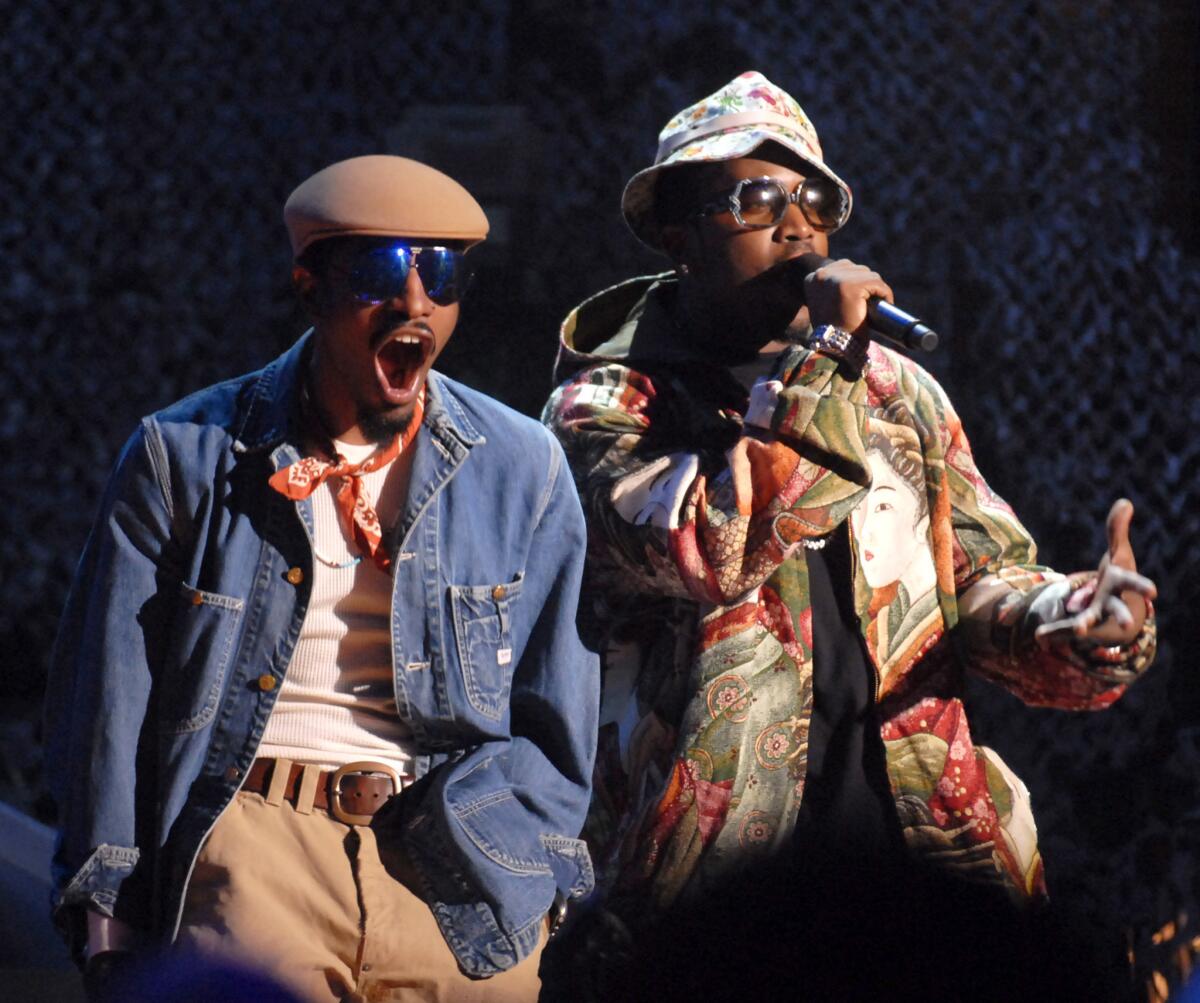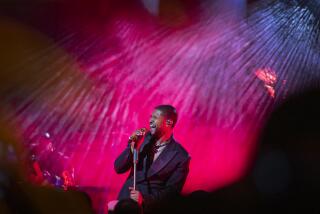Coachella 2014: The inside story on Outkast

One of the major draws of this year’s Coachella — and the whole of the upcoming festival season — is the return of the Atlanta hip-hop team Outkast. To a certain generation, the Grammy-winning, platinum-selling duo’s hits, including “Ms. Jackson,” “Hey Ya!” and “The Way You Move,” helped define the late 1990s and ‘00s.
Outkast, which headlines Coachella’s opening night Friday, is one of America’s great hip-hop exports. A smart, sonically curious Southern concern, the team reveled in pushing the boundaries of a genre that was trying to recover from the twin deaths of Biggie Smalls and Tupac Shakur.
But the group went on hiatus in 2007 following the release of its album and film “Idlewild,” and in the intervening years one member has worked on his acting chops and the other released inventive solo albums. The rumor mill never stopped churning of a reunion between the rappers Big Boi and Andre 3000.
INTERACTIVE: Plan your Coachella schedule
Seven years is a long time, especially in a culture whose short-term memory is diminishing with each puff of the vape. As such, a refresher course in the joys of Outkast is in order. Below, a primer.
Who: Andre “3000” Benjamin and Antwan “Big Boi” Patton. Were they the Rolling Stones, Benjamin would be the peacocky Mick Jagger, with attitude, charisma and a pop sensibility. Patton is the group’s Keith Richards: a devoted craftsman eager to push at the edges of his chosen genre while remaining true and respectful to its roots.
Benjamin’s style is immediately recognizable — he’s a cheeky romancer who celebrates language, loves fashion and has identified himself on Outkast’s recordings under aliases including Possum Aloysius Jenkins III, Cupid Valentino, Benjamin Bixby, Johnny Vulture and Touchy Tiger. Responsible for the “The Love Below” half of Outkast’s terrific double-disc “Speakerboxxx/The Love Below,” Benjamin’s “Hey Ya!” is one of the great hits of the ‘00s, what with its “Shake it like a Polaroid picture” refrain. The rapper/producer has acted in films including “Semi-Pro,” “Charlotte’s Web” and “Battle in Seattle,” and he stars as Jimi Hendrix in the just-released biopic “All Is By My Side.”
Patton is less outwardly playful, and his tracks tend to hit harder. Still, he’s as skilled a lyricist and rapper as anyone making hip-hop over the past few decades. His solo albums “Sir Lucious Left Foot: The Son of Chico Dusty” in 2010 and the 2012 album “Vicious Lies and Dangerous Rumors” further confirmed the artist as a stubborn creative force unbeholden to the charms of his flashier compadre. An avowed Kate Bush fanatic, Patton’s wide range of tastes permeate his tracks. His aliases? Daddy Fat Sacks, Hot Tub Tony and General Patton, among others.
GRAPHIC: Coachella 2014 by numbers
What: Part of a larger collective known as the Dungeon Family, Outkast burst out of Atlanta along with kindred spirits and longtime friends the Goodie Mob (featuring a young Cee Lo Green), as well as the production team Organized Noize, in the mid-1990s. They forged a joyous, bouncy sound that celebrated big pop hooks but remained devoted to bass-heavy tones of the so-called Dirty South and visionary, oft-surreal beats as experimental as any of the so-called underground rap then thriving in New York. Combined, the posse established themselves as a less self-serious, more celebratory version of Wu-Tang Clan, one with Southern flair and oversized personality.
Over nearly a decade, Outkast pushed a sound that was as identifiable as it was groundbreaking. One of its first major hits, “B.O.B. (Bombs Over Baghdad),” stuck out on radio because it was nearly twice as fast and frantic as anything else at the time. Alongside other rap headliners in the post-Biggie/Tupac era — Puff Daddy, No Limit Records and Busta Rhymes — Outkast’s sound popped and banged. As the pair earned accolades, they pushed their music into the mainstream with “Ms. Jackson,” a track whose lyrics address a girlfriend’s mother, apologizing for making her daughter cry, and “So Fresh, So Clean.”
“Synthesizer,” from the group’s breakout album “ATLiens” featuring Parliament-Funkadelic visionary George Clinton, tackled plastic surgery, self-esteem and future medicine with a brand of speedy funk that far removed from the crawling West Coast sound as practiced by Dr. Dre and Snoop Dogg. Or “Rosa Parks,” an uproarious tracks featuring a refrain, “Everybody move to the back of the bus,” which so upset the real Rosa Parks that she sued the duo.
COACHELLA 2014: Ten rising acts you should know now
Where: Outkast was signed by the rising Atlanta powerhouse record label La Face when the Southern city was establishing itself as the hub for black popular music in America. Alongside labelmates including Goodie Mob, Usher, TLC, Pink and Toni Braxton and fellow Georgians Ludacris and Lil Jon, Outkast helped reinforce the notion of a new South rising. Hitmakers also busting out of New Orleans, St. Louis and Memphis helped confirm hip-hop’s maturation in noncoastal realms.
When: Performing the first of dozens of festival slots throughout 2014, Outkast will land on the Coachella main stage at 11:30 p.m. The pair has been notably mum about their intentions. Will Sleepy Brown be there to croon the hook to “The Way You Move”? Chances are good, considering he’s listed as opener on some of Outkast’s dates. Following the tour kickoff in Indio, the team continues on the festival circuit, booking, among others, the Governor’s Ball in New York, Sasquatch outside of Seattle and the new Bottlerock festival in Napa Valley. (Where both Sir Lucious Left Foot and Possum Aloysius Jenkins III should feel right at home.)
Why: How many times will you be able to shake it like a Polaroid picture on the same plot of land as the man who coined and sang the phrase? Too few to count. That’s why.
More to Read
The biggest entertainment stories
Get our big stories about Hollywood, film, television, music, arts, culture and more right in your inbox as soon as they publish.
You may occasionally receive promotional content from the Los Angeles Times.










